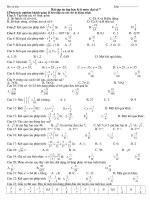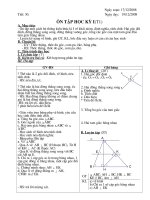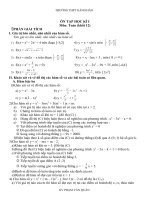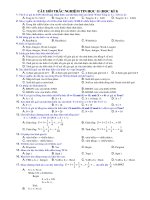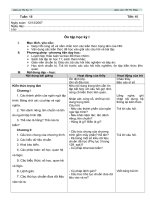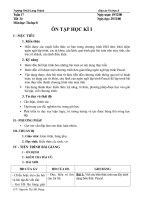on tap hki 1
Bạn đang xem bản rút gọn của tài liệu. Xem và tải ngay bản đầy đủ của tài liệu tại đây (105.33 KB, 3 trang )
<span class='text_page_counter'>(1)</span><div class='page_container' data-page=1>
<b> BAØI TẬP ƠN THI HỌC KÌ I (2010-2011)</b>
<b>I. Pick out the word whose underlined part pronounced differently from the others: </b>
1. A. climb B. kitchen C. drink D. continue
2. A. rich B. hit C. rid D. heat
3. A. sheep B. seek C. peak D. live .
4. A. maths B. hard C. subject D. far
5. A. money B. company C. complain D. father
6. A. party B. market C. narrow D. marvelous
7. A. boss B. broke C. both D. told
8. A. all B. talk C. salad D. false
9. A. four B. cost C. your D. pour
10. A. could B. pull C. full D. soup
11. A. good B. wood C. look D. cook
12. A. put B. pull C. full D. June
13. A. top B. wrong C. job D. more
14. A. walk B. talk C. call D. Shake
15.A. doctor B. money C. lost D. for
16. A. teacher B. about C. together D. early
17. A. bird B. girl C. thirty D. tire
18. A. excursion B. sunburnt C. nurse D. picture
19. A. weather B. ready C. early D. instead
20. A. wild B. tried C. violent D. live
21. A. style B. physics C. copy D. friendly
22. A. noise B. voice C. coin D. going
23. A. Play B. today C. mistake D. buy
24. A. paper B. wait C. taste D. star
25. A. like B. kite C. time D. disappoint
<b>II. Fill in the blanks with an appropriate preposition. (Điền giới từ đúng vào chỗ </b>
<b>trống)</b>
<b>Exercise 1: Giới từ theo sau tính từ.</b>
1. Ken was proud . . . ... . . . his good marks on English.
2. The room is full . . . . . . people.
3. I am anxious ……...her, I haven’t received a letter.
4. The streets are crowded …... . . . vehicles at the rush hour.
5. My home is far………school.
6. I am interested ……… current events
7. She is contented . . ... . . … her present life.
8. People are not satisfied ... . . . their lives.
9. He is different ……. His wife.
10. I am very worried ………... My son’s failure.
<b>Exercise 2: Giới từ theo sau động từ </b>
1. She still went ……….. writing her lesson in spite of the noise
2. He turned ………..….the lights because it was very dark.
3. Tom usually gets ………. at 6 o’clock
4. They usually worry………. money.
5. Miss Phuong comes ………. the rich family.
6. Tan has just turned ……… the TV because it is very noisy.
7. Another man-made satellite has been sent…….. …….. into space.
8. Ruler is used …………...drawing straight lines.
<b>Exercise 3: Giới từ chỉ thời gian, nơi chốn</b>
1. How are you? I haven’t seen you _________ ages.
2. He left school ________ the age of 18.
3. I’m going on holiday __________ the end of this month.
4. She was born ______________ May 12th<sub>, 1990.</sub>
5. Mary was standing _________ front of her desk.
6. It happened ________ 7.00 ________ the evening.
7. They plan to arrive in Paris _________ July 4th.
8. I have known her ___________ last year.
9. Mr. Foster lives_________ 667E 76th street______ New York.
10. Children like to go to the circus _________ sunday
11. He has been out of work __________ a long time.
<b>III. Fill in the blanks with “ used to/ be used to / be used for”.</b>
1. They………play football every Sunday morning.
2. Paul and Mary ………..…. meet each other on Mondays.
3. Radio ………….…….listen to news and music.
4. My father ……….. smoke a lot but he gave it up three years ago
5. The fax machine ……….………… send and receive the letter or picture quickly.
5. The air conditioner …………..………..keeping the air cool or warm.
6. I rarely eat ice-cream, but I ………..……….it when I was a child.
8. We came to live in Manchester a few years ago. We ….…….…….in California
<b>IV. Give the correct tense of the verbs in brackets:</b>
1. After lunch, I often (take) a rest. ………..
2. My sister usually (practice) playing the piano in the evening. ………...
3. My brother (visit) me last month. ………..
4. My brother (visit) me twice a week. ………..
5. My brother (visit) me before he went to HCMC. ………..
6. I (not meet) him last year. ………..
7. I (not meet) him since last year. ………..
8. They (arrive) at the club two days ago. ………..
9. She (learn) French for several years. ………..
10. I feel terrible. I think I (be) sick. ………..
11. We (have) an English-speaking club meeting next week. ………..
Would you like to come?
</div>
<span class='text_page_counter'>(2)</span><div class='page_container' data-page=2>
1. Let me see the letters ……...…………. You have written.
2. It was the nurse ……...………..… told me to come in.
3. I saw the man ……...……..… closed the door.
4. The girl …………...….….. won the race is very happy.
5. The man …………...……….. I saw yesterday is a doctor.
6. Who is the woman …...…………..…… we met here last week ?
7. The driver …………...……….. you want to see is not here.
8. The book ……...…………... I has bought is not good.
9. The boy ……...…………threw that stone will be punished.
10. They are repairing the house ………..… they bought in July.
<b>VI. Fill in the blanks with “Because of / in spite of”</b>
1. We arrived late …………...…the bad weather.
2. He couldn’t play in the game ……...……..…. his foot injury.
3. She had to study ………...…... her exam next week.
4. She only accepted the job ……...……….... the high salary.
5.The train was late …………...………. the thick fog.
6. She didn’t eat much ………...….…….. her hunger.
7. We did the test well ………...……..…it was difficult.
8. The flight was not delayed ……...………….. the fog.
9. ………...…….. the dark, they continued to work.
10. I went to school on time ……...……….the heavy rain.
11. ………... the cold weather, we kept the fire burning all day.
12. ………...…..…..the large crowds, there were enough seats for everyone.
13. Everyone is living on beans ………...…….….. the meat shortage.
14. He had to cancel the appointment……...………his illness.
15. They enjoyed living there …………...……… the bad condition of the house.
<b>VII. Gerund (V-ing) / Infinitive (to Verb):</b>
1) The teacher permits us (go) out in a minute ………..
2) Tell him (come) to see me at once ………..
3) He advises us (be) more studious. ………..
4) He’s expecting (make) a trip to Ha Long Bay. ………..
5) Students stopped (make) noise when the teacher came in. ………..
6) I enjoy (listen) to classical music. ………..
7) He’ll try (not make) the same mistake again. ………...
8) Would you mind (buy) me a newspaper? ………..
9) Would you like (have) a dance with me? ………..
10) I hope (not do) that tiring work again. ………..
11) They postponed (build) the school for lack of finance. ………..
12) Are his ideas worth (listen) to? ………..
13) He always avoids (meet) in the street. ………..
14) Do you agree (lend) me some money? ………..
15) Tom refused (give) me his address. ………..
16) Do you often practise (speak) English? ………..
17) It takes me hours (written) a letter. ………..
18) He is too busy (take) care of her. ………..
19) He gave up (smoke). ………..
20) My brother is fond of (collect) stamps. ………..
<b>VIII. Change into passive:</b>
1. Tom has done the homework. → The homework . . .
2. She bought a book. → A book . . .
3. Someone has watered the trees. → The trees. . .
4. He takes a bus to school. → A bus. . .
5. She played the piano. → the piano. . .
<b>IX. Combine the sentences, using “who, whom, which”.</b>
1. The street is very wide. It leads to my school.
→. . .
2. The boys are my cousins. They are playing in the garden.
→. . .
3. The people were very nice. We visited them two days ago.
→. . .
4. The pencil is mine. It is on the desk.
→. . .
5. The man is secretary. You saw him at the desk.
→. . .
<b>IX. Read the passage, then answer the questions:</b>
Alexander Graham Bell was born in Edinburgh, Scotland in the nineteenth
century, and later came to the United States. Several members of his family did a great
deal to encourage him in the field of science. His father helped him a lot by <i>supervising</i>
(giaùm saùt) his work with the deaf. When he worked with the deaf and investigated the
science acoustics, his studies eventually led to invention of multiple telegraphs and his
greatest invention – the telephone. He <i>dedicated</i> (cống hiến) the last quarter century of
his life to advances in <i>aviation</i> (khoa hoïc).
1. Where was Alexander Graham Bell born?
. . . .
2. Was he born in the nineteenth century?
. . . .
3. Did he come to the United Kingdom?
. . . .
4. How did his father help him?
. . . .
5. What is his greatest invention?
. . . .
6. How many years did he dedicate to aviation?
</div>
<span class='text_page_counter'>(3)</span><div class='page_container' data-page=3></div>
<!--links-->
